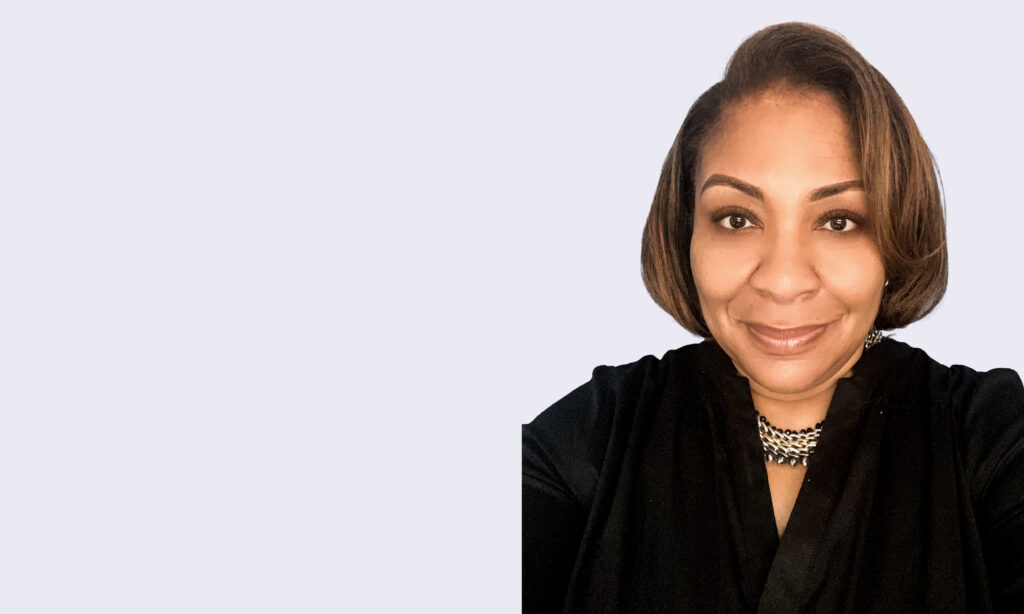Celebrating Black History Jenifer David

In recognition of Black History Month 2023, we are celebrating and sharing the stories of Black leaders and colleagues from across The SR Group and our networks. We are delighted to have been able to interview Jenifer David, Director of Human Resources and Operations Manager at Entertainment Partners.
Jenifer has been an HR professional for over 15 years and has served as an HR Generalist, HR Manager, Director of Human Resources including DEI and VP, HR. Her work has involved advising on all types of HR issues across multistate and she has played an instrumental role in DEI implementation and imbedding DEI into the fabric of the organization. Jenifer has also provided compliance management, advice and employee training across the US. She has a Master’s degree in Human Resources Management and Organizational Development. Jenifer is in the final stages of completing her PhD in Organizational Leadership.
How can corporations create an ecosystem based on diversity, equity, and inclusion to specifically benefit Black communities?
ERGs (Employee Resource Groups) are a great resource and medium for employers to make positive sustainable change in the workplace. ERGs create a psychologically safe space for employees to bring their whole authentic selves and openly make their voices heard. ERGs empower employees to take impactful, intentional actions on the things that matter to them, thereby creating an inclusive environment.
What challenges have you faced during your career journey as a Black leader, and how have you overcome some of these?
As a Black woman I have encountered discrimination and many microaggressions. I have used the challenges I experienced as learning opportunities and invested in my own professional growth, my emotional intelligence, confidence and willingness to take risks. I use my experiences to encourage others and to create a space where the people I encounter walk away feeling better after the experience. Unfortunately, we live in a world where Black women must work harder than their white counterpart and even Black men. I choose to stay positive! Embrace the challenges you encounter, know that they will make you stronger, stay true to who you are and allow yourself the grace to make mistakes and recover from them. Stand in your truth and faith.
How do you celebrate Black History Month? Are there any figures that you most admire or resonate with, whether they are famous or not?
I use the time to reflect on the sacrifices of the activists that came before us and celebrate their achievements. I engage in conversations with members of my team and co-workers who are willing to talk and learn more about Black History. I share my knowledge about my culture, but I also learn so much about other cultures too. I think about what we can do to move the needle forward so that my children and their children can get closer to equity and parity.
Each year I read Dr. Martin Luther King’s “I have a dream speech” – I am always overtaken with a wave of emotion and languish in the stark realization that despite Dr. King’s dream for Black people, we have not made much improvement for all Black people since then. As a people when we hear of the success of few Black men and women, we become content in the comforting thought that “we have made it” when our fight for equality for ALL people has only just begun.
When Dr. King made his speech in 1963, he spoke about the lack of meaningful change for all Black people after 100 years that slavery was abolished. Today – 158 years since the abolition of slavery, Black people and marginalized groups still fight for equality in America. In his speech Dr. King eloquently spoke about police brutality and the plight of Black people – a speech that is now historic with present context.
As the fight continues for equality of all people, let us reflect on an excerpt from Dr. King’s iconic speech:
But there is something that I must say to my people who stand on the warm threshold which leads into the palace of justice. In the process of gaining our rightful place, we must not be guilty of wrongful deeds. Let us not seek to satisfy our thirst for freedom by drinking from the cup of bitterness and hatred.We must forever conduct our struggle on the high plane of dignity and discipline. We must not allow our creative protest to degenerate into physical violence.
Dr. Martin Luther King
Is there a policy or legislation in the workplace that comes to mind as something which positively or negatively impacts Black workers in particular?
Historically policies and legislation have been created with a blanket, one size fits all approach. Time and research need to be dedicated to the intersectionality of minorities and the unintended negative impact of some policies and legislation on diverse communities of employees. Employers need to focus on creating equitable spaces for all employees and ensure that diverse communities have the support and structures necessary to capitalize on growth and development opportunities.
How has hybrid working impacted Black workers specifically (and/or historically excluded/historically underrepresented groups) and equity among workers? Have these impacts been positive, negative, or a bit of both?
Let’s start with the good – the hybrid workplace has minimized many microaggressions in the workplace as employees have transitioned to a virtual workspace. The hybrid work environment has also placed a spotlight on individual contributions and have forced everyone to be more communicative.
The bad – there has been a marked decrease in employees feeling a sense of connection and for diverse communities that isolated feeling has increased. While equity on the basis of race, gender and other protected classes is a key component of DEI, the discipline is actually broader – it’s about creating an even playing field for reward and advancement regardless of variables. Currently, companies are most focused on the day-to-day logistical challenges of balancing remote and in-person teams. But we can’t overlook the bigger issue of ensuring a level playing field. This starts with acknowledging and addressing the biases managers may hold toward in-person and remote work.
Any advice for early career talent within the Black community who are navigating the workforce?
- Invest in your own personal and professional development
- Network and step forward to take advantages of opportunities to showcase the added value you bring
- Talk to someone who has already done what you would like to do
- Create your circle, surround yourself with people you can learn from
- Don’t put too much pressure on yourself and don’t add to the pressure that already exists from society etc
- Be prepared to take risks, make mistakes, ask for forgiveness, and stand up in the moment – for yourself, for someone else, or for a cause. That is taking a risk
- Be willing to take on more and try something new. Take the opportunity to grow and make mistakes
- Show up as your authentic self
- Understand how you add value
- Listen and learn – it will help you grow
- Continue to ask the questions you need to ask
- Have intellectual curiosity and be a lifelong learner
- Don’t be afraid to try to do things differently
- Admit when you don’t know – surround yourself with people there to prop you up.
- Seek a variety of mentors to help with different parts of your career
How do aspiring Black leaders secure their rightful seat at the table?
To get your foot in the door, have thicker skin and be prepared for unconscious bias and microaggressions. Make sure you have a strong support system that you can lean into during the tough times and find the support you need to assist you in navigating uncertain waters. Speak up about injustices and don’t be afraid to let your voice be heard in a respectful and professional manner!
Input equals output when it comes to building your reputation.
Once you are in the room, success can still seem out of reach, as unintended assumptions all too often craft people’s perceptions, both in and out of the office. Minorities in leadership is still rare, and people might assume you were hired to fill a diversity quotient. Prove them wrong.
Make connections, invest in relationship building and pay it forward.
Focus your energy on being helpful and being a value add, more than being at the table.
If your desire to serve and add value is greater than to be at a particular table, your influence will rise, and in time opportunities will present themselves. This is always true. If not where you currently serve, someone somewhere will notice. There is always an opening, somewhere, for bright and capable young leaders — young leaders who are willing to pay the price and add value rather than assume a seat at the table is automatically deserved.
Demonstrate competence in the area you have been chosen to lead.
Excel in what you have been asked to do. Get really good at your job before you seek the next job. Learn your craft, get better, become the go-to person that everyone wants on their team. Your results should speak for themselves so loudly that you never have to call someone’s attention to how hard you work. Let’s be candid, no one cares how hard anyone works.
It’s not only about how good you are, it’s equally about how you demonstrate your influence and express your desires.
1 Timothy 3:1 says: “Whoever aspires to be an overseer desires a noble task.” (NIV) The rest of the verse, addresses the qualifications of the leader:
- Character
- Reputation
- Demeanor
- Attitude
- Emotion
- Self-leadership
- Ego
- Sincerity
- Relationships
In short, who you are affects how you serve and lead.


